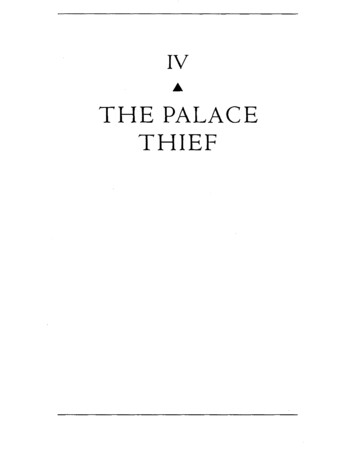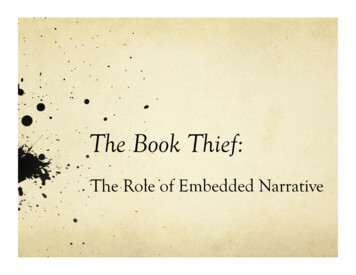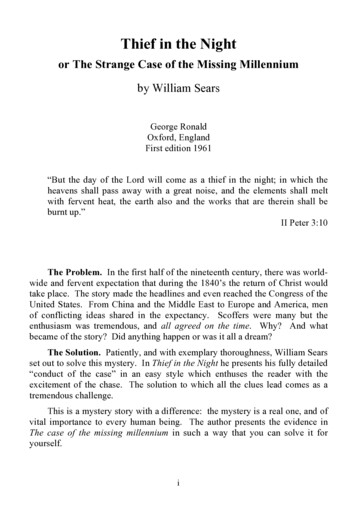
Transcription
IVTHE PALACETHIEF
tell this story not for my o,vn honor, for there is little ofthat here, and not as a ,varning, for a man of my callinglearns quickly that all warnings are in vain. Nor do I tell itin apology for St. Benedict's School, for St. Benedict's Schoolneeds no apologies. I tell it only to record certain foretellableincidents in the life of a well-known man, in the event that thebrief candle of his days may sometime come under the scrutinyof another student of history. That is all. This is a story ,vithoutsurpnses.There are those, in fact, ,vho say I should have known what,vould happen benveen St. Benedict's and me, and I supposethat they are right; but I loved that school. I gave service thereto the minds of three generations of boys and al,vays left uponthem, if I ,vas successful, the delicate imprint of their culture.I battled their indolence ,vith discipline, their boorishness ,vithphilosophy, and the arrogance of their stations with the historyof great men before them . I taught the sons of nineteen senators. I taught a boy ,vho, if not for the vengeful recriminationsof the tabloids, ,vould toda y have been president of the UnitedStates. That school ,vas my life.I
156 A THE PALACE THIEFThis is ,vhy, I suppose, I accepted the invitation sent to meby Mr. Sedge,vick Bell at the end of last year, although I shouldhave kno,vn better. I suppose I should have recalled ,vhat kindof boy he had been at St. Benedict's forty-one years beforeinstead of posting my response so promptly in the mail andbeginning that evening to prepare my test. He, of course, ,vasthe son of Senator Sedge,vick Hyram Bell, the West Virginiademagogue ,vho kept horses at his residence in Washington,D.C., and had s,vung several southern states for WendellWilkie. The younger Sedge,vick ,vas a dull boy.I first met him ,vhen I had been teaching history at St.Benedict's for only five years, in the autumn after his father hadbeen delivered to office on the shoulders of southern patriciansfrightened by the unionization of steel and mine ,vorkers.Sedge,vick appeared in my classroom in November of 1945, ina short-pants suit. It was mid,vay through the fall term, thatterm in ,vhich I brought the boys forth from the philosophicalidealism of the Greeks into the realm of commerce, militarymight, and the law, ,vhich had given Julius Caesar his prerogative from M\acedonia to Seville. My students, of course, ,vereagitated. It is a sad distinction of that age group, the exuberance,vith ,vhich the boys abandon the moral endeavor of Plato andembrace the po,verful, pragmatic hand of Augustus. The moresensitive ones had gro,vn silent, and for several weeks our classdiscussions had been dominated by the martial instincts of thecoarser boys. Of course I ,vas sorry for this, but I ,vas ,vell a,vareof the import of ,vhat I taught at St. Benedict's. Our headmaster, Mr. "\Voodbridge, made us continually a,vare of the role ourstudents ,vould eventually play in the affairs of our country.My classroom ,vas in fact a tribute to the lofty ideals of man,,vhich I hoped ,vould inspire my boys, and at the same time tothe fleeting nature of human accomplishment, ,vhich I hopedI
THE PAIACE THIEF .6. 157would temper their ambition ,vith humility. It was a dual tactic,with ,vhich Mr. Woodbridge heartily agreed. Above the doorframe hung a tablet, made as a term project by Henry L.Stimson ,vhen he ,vas a boy here, that I hoped would teach mystudents of the irony that history besto,vs upon ambition. Inday relief it said:I am Shutruk-Nahhunte, King of Anshan and Susa,sovereign of the land of Elam.By the command of Inshushinak,I destroyedSippar, took the stele of Naram-Sin,and brought it back to Elam,where I erected it as an offering to my god,Inshushinak.-Shutruk-Nahhunte,1158B.C.I ahvays noted this tablet to the boys on their first day in myclassroom, partly to inform them of their predecessors at St.Benedict's and partly to remind them of the great ambition andconquest that had been utterly forgotten centuries before they,vere born. Afterward I had one of them recite, from the ,vall,vhere it hung above my desk, Shelley's "Ozymandias." It iscritical for any man of import to understand his o,vn insignificance before the sands of time, and this is ,vhat my classroomahvays sho,ved my boys.As young Sedge,vick Bell stood in the doonvay of thatclassroom his first day at St. Benedict's, ho,vever, it ,vas apparent that such efforts ,vould be lost on him. I could see that he,vas not only a dullard but a roustabout. The boys happened tobe ,vearing the togas they had made from sheets and safety pinsthe day before, spreading their knees like magistrates in the,vooden desk chairs, and I ,vas taking them through the recita-
158 .A. THE PAIACE THIEFtion of the emperors, when Mr. Woodbridge entered alongsidethe stout, red-faced Sedgewick, and introduced him to theclass.I had taught for several years already, as I have said, and Ikne,v the look of frightened, desperate bravura on a ne,v boy'sface. Sedge,vick Bell did not ,vear this look. Rather, he ,voreone of disdain. The boys, fifteen in all, ,vere instantly intimidated into sensing the foolishness of their improvised cloaks,and one of them, Fred Masoudi, the leader of the dullardsthough far from a dullard himself--said, to mild laughter,"Where's your toga, kid?"Sedge,vick Bell ans,vered, "Your mother must be ,vearingyour pants today."It took me a moment to regain the attention of the class, and,vhen Sedgewick ,vas seated I had him go to the board and copyout the emperors. Of course, he did not know the names of anyof them, and my boys had to call them out, repeatedly correcting his spelling as he ,vrote out in a sloppy all the ,vhile lifting and resettling the legs of his short pants inmockery of ,vhat his ne,v classmates ,vere ,vearing. "Youngman," I said, "this is a serious class, and I expect that you ,villtake it seriously.""If it's such a serious class, then ,vhy're they all ,vearingdresses?" he responded, again to laughter, although by no,v
THE PALACE THIEF A 159Fred Masoudi had loosened the rope belt at his ,vaist and theboys around him ,vere shifting uncomfortably in their togas.From that first day, Sedgewick Bell was a boor and a bully, adamper to the illumination of the eager minds of my boys anda purveyor of the mean-spirited humor that is like kerosene in aschool such as ours. What I asked of my boys that semester ,vassimple-that they learn the facts I presented to them in an"Outline of Ancient Roman History," ,vhich I had ,vhittled,through my years of teaching, to exactly four closely typed pages;yet Sedgewick Bell was unwilling to do so. He ,vas a poor studentand on his first exam could not even tell me ,vho it ,vas that MarkAntony and Octavian had routed at Philippi, nor ,vho Octavianlater became, although an average wood-beetle in the floor of myclassroom could have done so with ease.Furthermore, as soon as he arrived he began a stream ofcapers using spitballs, wads of gum, and thumbtacks. Of courseit was common for a new boy to engage his comrades thusly,but Sedgewick Bell then began to add the dangerous elementof natural leadership--which was based on the physical strengthof his features-to his otherwise puerile antics. He organizedthe boys. At exactly fifteen minutes to the hour, they would alldrop their pencils at once, or cough, or slap closed their booksso that writing at the blackboard my hands would jump inthe air . At a boys' school, of course, punishment is a cultivated art.Whenever one of these antics occurred, I simply made a pointof calling on Sedgewick Bell to answer a question. Generallaughter usually followed his stabs at ans,vers, and althoughSedgewick himself usually laughed along ,vith everyone else, itdid not require a great deal of insight to kno,v that the tactic,vould ,vork. The organized events began to occur less frequently.
160 A THE PALACE THIEFIn retrospect, ho,vever, perhaps my strategy ,vas a mistake,for to convince a boy of his o,vn stupidity is to shoot a poisonous arrow indeed. Perhaps Sedgewick Bell's life would haveturned out more nobly if I had understood his motivationsright away and treated him differently at the start. But such arethe pointless speculations of a teacher. What ,vas irrefutablytrue ,vas that he ,vas performing poorly on his quizzes, even ifhis behavior had improved somewhat, and therefore I calledhim to my office.In those days I lived in small quarters off the rear of the mainhall, in ,vhat had been a slave's room ,vhen the grounds of St.Benedict's had been the estate of the philanthropist and horsebreeder Cyrus Beck. Having been at school as long as I had, Ino longer lived in the first-form dormitory that stood behindmy room, but supervised it, so that I saw most of the boys onlyin matters of urgency. They came sheepishly before me.With my bed folded into the ,vall, the room became myoffice, and shortly after supper one day that ,vinter of hisfirst-form year, Sedge,vick Bell knocked and entered. Immediately he began to inspect the premises, casting his eyes, whichhad the patrician set of his father's, from the desk to the shelvesto the bed folded into the ,vall."Sit down, boy.""You're not married, are you, sir?""No, Sedgewick, I am not. However, we are here to talkabout you.""That's why you like puttin' us in t gas, right?"Frankly, I had never encountered a boy like him before, whoat the age of thirteen ,vould affront his schoolmaster ,vithout .other boys in audience. He gazed at me flatly, his chin in hishand."Young man," I said, sensing his motivations ,vith sudden
THE PAI.ACE THIEF 161clarity, "we are concerned about your performance here, and Ihave made an appointment to see your father."In fact, I had made no appointment with Senator Bell, butat that moment I understood that I ,vould have to. "Whatwould you like me to tell the senator?" I said.His .gaze faltered. "I'm going to try harder, sir, fromno,v on.""Good, Sedge,vick. Good."Indeed, that week the boys reenacted the pivotal scenes fromJulius Caesar, and Sedge,vick read his lines quite passably andcontributed little that I could see to the occasional fits of gigglesthat circulated among the slo,ver boys. The next week, I gavea quiz on the triumvirate of Crassus, Pompey, and Caesar, andhe passed for the first time yet, ,vith a C plus.Nonetheless, I had told him that I ,vas going to speak ,vithhis father, and this is ,vhat I ,vas determined to do. At the time,Senator Sedgewick Hyram Bell was appearing regularly in thenewspapers and on the radio in his stand against Truman's planfor national health insurance, and I was loath to call upon sucha ,veil-known man concerning the behavior of his son. On theradio his voice ,vas a tobacco drawl that had won him populistappeal throughout West Virginia, although his policies alonewould certainly not have done so. I ,vas at the time in my latetwenties, and although I was armed with scruples and an education, my hands trembled as I dialed his office. To my surprise,I was put through, and the senator, in the dra,vl I recognizedinstantly, agreed to meet me one afternoon the follo,ving week.The man already enjoyed national stature, of course, and although any other father ,vould no doubt have made the journeyto St. Benedict's himself, I admit that the prospect of seeing theman in his o,vn office intrigued me. Thus I journeyed to thecapital.
162 . THE PALACE THIEFSt. Benedict's lies in the bucolic, equine expanse of ruralVirginia, nearer in spirit to the Carolinas than to Maryland,although the drive to Washington requires little more than anhour. The bus followed the misty, serpentine course of thePassamic, then entered the marshlands that are now the falsebrick suburbs of Washington, and at last left me downtown inthe capital, ,vhere I proceeded the rest of the way on foot. Iarrived at the Senate office building as ·the sun moved lowagainst the bare-limbed cherries among the grounds. I ,vasfrightened but determined, and I reminded myself that Sedge,vick Hyram Bell was a senator but also a father, and I ,vas hereon business that concerned his son. The office was as grand asa duke's.I had not waited long in the anteroom when the man himselfappeared, feisty as a game hen, bursting through a side doorand clapping me on the shoulder as he urged me before himinto his office. Of course I was a novice then in the ,vorld ofpolitics and had not yet realized that such men are, above all,likeable. He put me in a leather seat, offered me a cigar, whichI refused, and then with real or contrived wonder-perhaps hedid something like this with all of his visitors-he proceeded toshow me an antique sidearm that had been sent to him thatmorning by a constituent and that had once belonged, he said,to the coachman of Robert E. Lee. "You're a history buff," hesaid, "right?""Yes, sir.""Then take it. It's yours.""No, sir. I couldn't.""Take the damn thing.""All right, I ,vill.""Now, ,vhat brings you to this dreary little office?""Your son, sir."
THE PALACE THIEF 163"What the devil has he done now?""Very little, sir. We're concerned that he isn't learning thematerial.""What material is that?""We're studying the Romans no,v, sir. We've left the Republic and entered the Empire.""Ah," he said. "Be careful with that, by the way. It stillfires.""Your son seems not to be paying attention, sir."He again offered me the box of cigars across the desk andthen bit off the end of his o,vn. "Tell me," he said, puffing thething until it flamed suddenly, "What's the good of what you 'reteaching them boys?''This was· a question for ,vhich I ,vas ,veil prepared, fortunately, having recently written a short piece in The St. Benedict1sCrier answering the same challenge put forth there by ananonymous boy. "When they read of the reign of AugustusCaesar," I said without hesitation, "when they learn that hisrule was bolstered by commerce, a postal system, and the arts,by the reformation of the senate and by the righting of aninequitable system of taxation, when they see the effect ofscientific progress through the census and the enviable net\vorkof Roman roads, how these advances led mankind a,vay fromthe brutish rivalries of potentates into the nvo centuries of Pax· Romana, then they understand the importance of character andhigh ideals."He puffed at his cigar. "Now, that's a horse ,vho can talk,"he said. "And you're telling me my son Sedgewick has his headin the clouds .""It's my job, sir, to mold your son's character ."He thought for a moment, idly fingering a match. Then hislook turned stem. "I'm sorry, young man," he said slo,vly,
164 A THE PALACE THIEF"but you will not mold him. I ,vill mold him. You will merelyteach him."That ,vas the end of my intervie,v, and I ,vas politely sho,vnthe door. I ,vas bewildered, naturally, and found myself in theelevator before I could even take account of what had happened. se·nator Bell ,vas quite likeable, as I have q.oted, but hehad ,vithout doubt cut me, and as I made my ,vay back to thebus station, the gun sto,ved deep in my briefcase, I considered,vhat it must have been like to have been raised under such atyrant. My heart ,vanned some,vhat to,vard young Sedge,vick.Back at St. Benedict's, furthermore, I sa,v that my ,vords hadevidently had some effect on the boy, for in the ,veeks thatfollo,ved he continued on his struggling, uphill course . Hepassed two more quizzes, receiving an A minus on one of them.For his midterm project he·produced an adequate papier-macherendering of Hadrian's gate, and in class he ,vas less disruptiveto the group of do-nothings among ,vhom he sat, if indeed hewas not in fact attentive.Such, of course, are the honeyed morsels of a teacher'sexistence, those students ,vho come, under one's o,vn direction, from darkness into the light, and I admit that I might havetaken a special interest that term in Sedge,vick Bell. If I gavehim the benefit of the doubt on his quizzes ,vhen he straddledt\vo grades, if I began to call on him in class only for thosequestions I had reason to believe he could ans,ver, then I ,vasmerely trying to encourage the nascent curiosity of a boy ,vho,to all appearances, ,vas struggling gamely from beneath theformidable umbra of his father.The fall term ,vas by then dra,ving to a dose, and the boyshad begun the frenzy of preliminary quizzes for the annual"Mr. Julius Caesar" competition. Here again, I suppose I ,vasin my o,vn ,vay rooting for Sedge,vick. "Mr. Julius Caesar" is
THE PAIACE THIEF A 165a St. Benedict's tradition, held in reverence among the boys, thekind of mythic ritual that is the currency of a school like ours.It is a contest, held in two phases. The first is a narrowingmaneuver, by means of a dozen ,vritten quizzes, from \vhichthree boys from the first form emerge victorious. The secondis a public tournament, in \vhich these three take the stagebefore the assembled student body and ans,ver questions aboutancient Rome until one alone emerges triumphant, as hadCaesar himself from among Crassus and Pompey. Parents andgraduates fill out the audience. In front of Mr . Woodbridge'soffice a plaque attests to the "Mr. Julius Caesars" of the previous half-century-a list that begins ,vith John F. Dulles in1901-and although the ritual might seem quaint to those ,vhohave not attended St. Benedict's, I can only say that in a schoollike ours one cannot overstate the importance of a public joust.That year I had three obvious contenders: Fred Masoudi,who, as I intimated, ,vas a somewhat gifted boy; Martin Blythe,a studious type; and Deepak Mehta, the son. of a Bombaymathematician, who ,vas dreadfully quiet but clearly my beststudent. It ,vas Deepak, in fact, ,vho on his o,vn and entirelyseparate from the class had studied the disparate peoples, fromthe Carthaginians to the Egyptians, ,vhom the Romans hadconquered.By the end of the narro,ving quizzes, ho\vever, a surprisingconfiguration had emerged: Sedgewick Bell had pulled himselfto within a fe,v points of third place in my class. This ,vas ,vhenI made my first mistake. Although I should certainly havekno,vn better, I ,vas impressed enough by his efforts that Ibroke one of the cardinal rules of teaching: I gave him an A ona quiz on ·which he had earned only a B, and in so doing, Ileapfrogged him over Martin Blythe. On the fifteenth of March,,vhen the three finalists took their seats on stage in front of the
166 .&. THE PAI.ACE THIEFassembled population of the school, Sedgewick Bell was amongthem, and his father was among the audience.The three boys had donned their togas for the event and,vere arranged around the dais, on which a pe,vter platter heldthe green silk garland that, at the end of the morning, I wouldplace upon the brow of the ,vinner. As the interrogator, I stoodfront ro,v, center, next to Mr. Woodbridge."Which language ,vas spoken by the Sabines?""Oscan," ans,vered Fred Masoudi ,vithout hesitation."Who composed the Second Triumvirate?""Mark Antony, Octavian, and Marcus Aemilius Lepidus,sir," answered Deepak Mehta."Who was routed at Philippi?"Sedgewick Bell's eyes sho,ved no recognition. He lo,veredhis head in his hands as though pushing himself to the limit ofhis intellect, and in the front row my heart dropped. Severalboys in the audience began to nvitter. Sedgewick's leg began toshake inside his toga. When he looked up again, I felt that it wasI who had put him in this untenable position, I ,vho hadbrought a tender bud too soon into the heat, and I ,vonderedif he ,vould ever forgive me; but then, ,vithout warning, hesmiled slightly, folded his hands, and said, "Brutus and Cassius.""Good," I said, instinctively. Then I gathered my poise."Who deposed Romulus Augustulus, the last emperor of theWestern Empire?''"Odoacer," Fred Masoudi answered, then added,476 A.D.""Who introduced the professional army to Rome?""Gaius Marius, sir," ans,vered Deepak Mehta, then himselfadded, "in 104 B.c."When I asked Sedge,vick his next question-Who ,vas theleading Carthaginian general of the Second Punic W ar?-I felt
THE PALACE THIEF .6. 167some unease because the boys in the audience seemed to sensethat ·I was favoring him ,vith an easier examination. Nonetheless, his head sank into his hands, and he appeared once againto be straining the limits of his memory before he looked upand produced the obvious ans,ver, "Hannibal."I was delighted. Not only ,vas he proving my gamble worthwhile but he was sho,ving the twittering boys in the audiencethat, under fire, discipline produces accurate thought. By nowthey had quieted, and I had the sudden, heartening premonition that Sedgewick Bell ,vas going to surprise us after all, thathis tortoiselike deliberation ,vould win him, by morning's end,the garland of laurel.The next several rounds of questions proceeded much in thesame manner as had the previous two. Deepak Mehta and FredMasoudi answered without hesitation, and Sedgewick Bell didso only after a tedious and deliberate period of thought. WhatI .realized, in fact, was that his style made for excellent theater.The parents, I could see, were impressed, and Mr. Woodbridgenext to me, no doubt thinking about the next Annual Funddrive, was smiling broadly.After a second-form boy had brought a glass of ,vater to eachof the contestants, I moved on to the next level of questions.These had been chosen for their difficulty, and on the firstround Fred Masoud.i fell out, not kno,ving the names of Augustus's children. He left the stage and moved back among hisdim-witted pals in the audience. By the rule of clock\vise progression the same question then ,vent to Deepak Mehta, ,vhoans,vered it correctly, followed by the next one, which concerned King Jugurtha of Numidia . Then, because I had nochoice, I had to ask Sedge,vick Bell something difficult: "Whichgeneral had the support of the aristocrats in the civil ,var of88 B.C.?"To the side, I could see several parents pursing their lips and
168 A 1HE PAIACE THIEFfurrowing their brows, but Sedgewick Bell appeared to noteven notice the greater difficulty of the query. Again hedropped his head into his hands. By now the audience expectedhis period of deliberation, and they sat quietly. One could hearthe hum of the ventilation system and the dripping of the iciclesoutside. Sedgewick Bell cast his eyes down\vard, and it was atthis moment that I realized he was cheating.I had come to this job straight from my degree at CarletonCollege at the age of twenty-one, having missed enlistment dueto myopia, and carrying ,vith me the hope that I could give tomy boys the more important vision that my classical studies hadgiven to me. I kne,v that they responded best to challenge. Iknew that a teacher who coddled them at that age would onlyhold them back, would keep them in the bosoms of theirmothers so long that they would remain weak-minded throughpreparatory school and inevitably then through college. Thebest of my o,vn teachers had been tyrants. I well rememberedthis. Yet at that moment I felt an inexplicable pity for the boy.Was it simply the humiliation we had both suffered at the handsof his father? I peered through my glasses at the stage and knewat once that he had attached the "Outline of Ancient RomanHistory" to the inside of his toga.I don't kno,v ho,v long I stood there, between the schoolassembled behind me and the two boys seated in front, butafter a period of internal deliberation, during which time Icould hear the rising murmurs of the audience, I decided thatin the long run it was best for Sedgewick Bell to be caught.Oh, how the battle is lost for ,vant of a horse! I leaned to Mr .Woodbridge next to me and \vhispered, "I believe SedgewickBell is cheating.""Ignore it," he \vhispered back.''What?''Of course, I have great respect for ,vhat Mr. Woodbridge did
THE PAIACE THIEF .A. 169for St. Benedict's in the years he was among us. A headmaster'sworld is a far more complex one than a teacher's, and it ishistorically inopportune to blame a life gone afoul on a singleincident in childhood. Ho,vever, I myself would have stood upfor our principles had Mr. Woodbridge not at that point said,"Ignore it, Hundert, or look for another job ."Naturally, my headmaster's ,vords startled me for a moment;but being familiar with the necessities of a boys' school, andhaving recently entertained my first thoughts about one daybecoming a headmaster myself, I simply nodded ,vhen Sedge\vick Bell produced the correct ans\ver, Lucius Cornelius Sulla.Then I went on to the next question, ,vhich concerned ScipioAfricanus Major. Deepak Mehta ans,vered it correctly, and Iturned once again to Sedgewick Bell.In a position of moral leadership, of course, compromisebegets only more compromise, and although I kno,v this no,vfrom my o,vn experience, at the time I did so only from mystudy of history. Perhaps that is why I again found an untenablecompassion muddying my thoughts. What kind of desperationwould lead a boy to cheat on a public stage? His father andmother were ,veil back in the crowded theater, but when Iglanced behind me, my eye ,vent instantly to them, as thoughthey ,vere indeed my o,vn parents, out from Kansas City. "Who,vere the first emperors to reign over the divided Empire?" Iasked Sedge,vick Bell.When one knows the magician's trick, the only ,vonder is inits obviousness, and as Sedge,vick Bell lo,vered his head thistime, I clearly saw the nervous flutter of his gaze directed intothe toga. Indeed I imagined him scanning the entire "Outline,"from Augustus to Jovian, pasted inside the nvill, before comingto the answer, ,vhich pretending to ponder, he then spokealoud: "V alentinian the First, and Valens."Suddenly Senator Bell called out, "That's my boy!"
170 A THE PALACE THIEFThe crowd thundered, and I had the sudden, indefensibleurge to steer the contest in young Sedge,vick Bell's direction.In a fe,v moments, however, from ,vithin the subsiding din, Iheard the thin, accented voice of a woman speaking DeepakMehta' s name; and it \Vas the presence of his mother, I suppose, that finally brought me to my senses. Deepak answeredthe next question, about Diocletian, correctly, and then Iturned to Sedge,vick Bell and asked him; "Who ,vas HamilcarBarca?''Of course, it ,vas only Deepak ,vho kne,v that this ans,verwas not in the "Outline," because Hamilcar Barca was a Phoenician general eventually routed by the Romans; it was onlyDeepak, as I have noted, ,vho had bothered to study theconquered peoples. He briefly widened his eyes at me-inrecognition? in gratitude? in disapproval?-while beside himSedge,vick Bell again lowered his head into his hands . After along pause, Sedgewick asked me to repeat the question.I did so, and after another long pause, he scratched his head.Finally, he said, "Jeez ."The boys in the audience laughed, but I turned and silencedthem. Then I put the same question to Deepak Mehta, whoanswered it correctly, of course, and then received a round ofapplause that was polite but not sustained.It ,vas only as I mounted the stage to present Deepak ,viththe garland of Laurel, however, that I glanced at Mr . Woodbridge and realized that he too had ,vanted me to steer thecontest toward Sedge,vick Bell. At the same moment, I sa,vSenator Bell making his way to,vard the rear door of the hall.Young Sedge,vick stood limply to the side of me, and I believeI had my first inkling then of the mighty forces that ,vould twistthe life of that boy. I could only imagine his thoughts as hestood there on stage while his mother, struggling to catch up
THE PALACE THIEF 171with the senator, vanished through the fire door at the back. Bythe next morning, our calligraphers would add Deepak Mehta'sname to the plaque outside Mr . Woodbridge's office, andyoung Sedgewick Bell would begin his lifelong pursuit ofmissed glory.Yet perhaps because of the disappointment I could see in Mr.Woodbridge's eyes, it someho,v seemed that I was the one whohad failed the boy, and as soon as the auditorium ,vas empty,I left for his room. There I found him seated on the bed, stillin his toga, gazing out the small ,vindo,v to the lacrosse fields.I could see the sheets of my "Outline" pressed against theinside of his garment."Well, young man," I said, knocking on the door frame,"that certainly was an interesting performance."He turned around from the window and looked at mecoldly. What he did next I have thought about many times overthe years, the labyrinthine wiliness of it, and I can only attributethe precociousness of his maneuvering to the bitter educationhe must have received at home. As I stood before him in thedoorway, Sedge,vick Bell reached inside his cloak and one at atime lifted out the pages of my "Outline. ,iI stepped inside and dosed the door. Every teacher knows ascore of boys who do their best to be expelled; this is a clichein a school like ours, but as soon as I closed the door to hisroom and he acknowledged the act with a feline smile, I knewthat this was not Sedgewick Bell's intention at all."I kne,v you saw," he said."Yes, you are correct-.""How come you didn't say anything, eh, Mr. Hundert?""It's a complicated matter, Sedge,vick.""It's because my pop ,vas there.""It had nothing to do with your father."
172 .A THE PAIACE THIEF"Sure, Mr. Hundert. ''Frankly, I was at my wits' end, first from what Mr. Woodbridge had said to me in the theater and now from the audacityof the boy's accusation. I myself went to the ,vindow then andlet my eyes wander over the campus so that they ,vould not haveto engage the dark, accusatory gaze of Sedgewick Bell. "Whattranspires in an act of omission like the one I had committed?I do not blame Mr. Woodbridge, of course, any more than asoldier can blame his captain. "What had happened ,vas thatinstead of enforcing my own code of morals, I had allo,vedSedgewick Bell to sweep me summarily into his. I did not kno,vat the time what an act of corruption I had c
THE PAIACE THIEF .6. 157 would temper their ambition ,vith humility. It was a dual tactic, with ,vhich Mr. Woodbridge heartily agreed. Above the door frame hung a tablet, made as a term project by Henry L. Stimson ,vhen he ,vas a boy here, that I hoped would teach my stud










